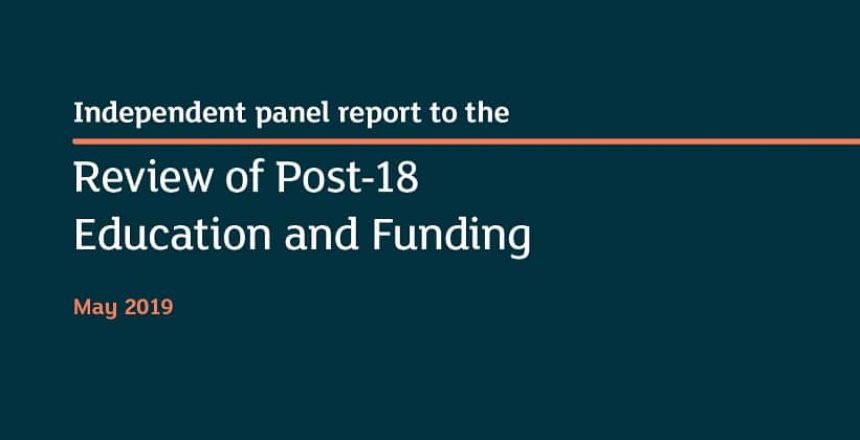Deborah Talbot, Communications Officer at MWS, looks at the recently published Augar report and asks whether it really has the answers to the challenges facing post-18 education.
The Augar report on post-18 education has been eagerly and nervously awaited in equal measure. Published in May 2019, the report made recommendations on post-18 funding as well as on the balance between vocational and academic education.
Sceptics claim that the report, commissioned by Theresa May, may not ever translate into policy given the effective ending of her government and the ongoing Brexit crisis. Critics from the university sector have also pointed out that proposals to shift funding to the FE sector from HE, by increasing the cost of student loans while lowering tuition fees, will mean students will lose out in terms of course quality and long-term financial security.
However, as MWS’s CEO, Richard Alberg, pointed out:
“The writing has been on the wall for some time in terms of higher education funding. The inclusion of student loans into the national debt, which happened last year, would inevitably precipitate a review of HE financing. What is unclear is whether the Augar report has the right answers or will even be translated into policy.”
In the wake of ongoing research showing the gap between the content of education and employers’ expectation and needs, it has long been a mission of this government to rebalance academic and vocational education and prioritise skills training. What’s new about the Augar Report is that it advocates a shift of emphasis to the FE sector, which for ten years has, according to the Institute for Fiscal Studies, been the most significant recipient of government education cuts.
To summarise the proposals:
- The report’s core message is that ‘the disparity between the 50 per cent of young people attending higher education and the other 50 per cent who do not needs to be addressed’.
- Technical and vocational education at the sub-degree level (levels 4 and 5) need to be strengthened to meet skills shortages.
- Cuts to adult skills training should be reversed, and part-time and ‘later life learning’ encouraged.
- Reform and re-fund the FE sector – rationalise provision, increase funding for high return courses, improve links to HE, invest in staff to improve recruitment and retention.
- HE institutions should ‘bear down on low-value courses’ and align provision with the needs of the economy.
- HE fees reduced to £7,500 per year and instead direct funding to high-cost and high-value subjects and disadvantaged students.
- Increase learning flexibility and lifelong learning (supported by a ‘lifelong learning allowance’), in line with changing career structures.
- Freeze the repayment threshold for student loans and extend the repayment period.
- Improve apprenticeship provision with better wage return information for careers, strengthening quality through enhancing Ofsted’s role and addressing the barriers SMEs experience in accessing the system. Level 6 and 7 apprenticeships should not be funded if recipients already have a degree.
Education and the economy
There are very few who would argue with more funding for the FE sector and the vital role they play in skills training and lifelong learning. Moreover, over the past few years, many colleges have been adept at reforming and reorganising to become significant players in local and regional economies.
Yet many would also argue that the contribution of degree, masters and doctoral education to economic performance is also hugely significant, particularly as we enter the Fourth Industrial Revolution and the importance of knowledge sectors such as IT, AI, research and the creative economy.
If educational experts and practitioners were put in a room together, they would undoubtedly agree that all sectors of the education system, from pre-school to doctoral, from level 2 to level 8 apprenticeships, all play a vital role in social mobility and economic performance. Indeed, it has never been more evident that the economic prospects of a nation are intimately linked to the educational level and skills of its citizens, as Enrico Moretti’s ground-breaking research found.
Investment in education has a high return, yet the Augar report, while arguing for increased spending, presents funding options as a series of either/or – you take from one sector to give to another. It never asks the question as to whether the funding pot should be increased across all sectors to amplify those socio-economic returns.
Vocational/technical and academic education
The report implicitly views vocational/technical and academic education as two separate forms of knowledge, yet increasingly, both FE and HE sectors are eroding the barriers between the two. This process is most clearly seen in the apprenticeships sector, where academic and theoretical learning is combined with skills training – and arguably this occurs across all levels to different degrees, not just at level 6 and above.
Why? Because the UK economy performs better when it’s focused on high-skilled jobs, and high-skilled jobs need both skills and technical knowledge as well as lateral and creative thinking. Indeed, according to Klaus Schwab, author of the book The Fourth Industrial Revolution, what defines the new economic realities are a fusion of the social, biological and digital worlds, which impact all disciplines. AI will need experts on ethics, sociology and economics as well as high-level technical and scientific skills.
The Augar report has played a valuable role in highlighting the precarious and undervalued state of the FE sector and the 50% of young adults who never make it to university. It also has started an important conversation about skills and employment.
However, it has yet to convince that it has sufficiently understood the relationship between education and training and socio-economic needs, or that it has an innovative plan for the future of education.

